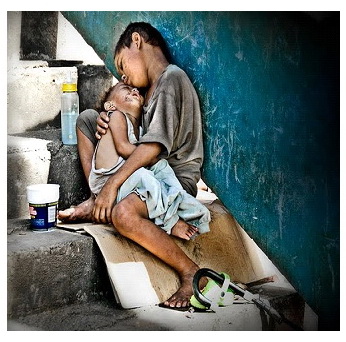 Chris
McDonnell, UK
Chris
McDonnell, UKchristymac733@gmail.com
 Chris
McDonnell, UK
Chris
McDonnell, UK
christymac733@gmail.com
Previous articles by Chris
Comments
welcome here In the poverty of the
Christ Early in his ministry as
Bishop of Rome, Francis put the principle of a Church of the Poor at the
forefront of his teaching. A Church that is poor, speaking to those who
are poor. It was-and is-a clear statement of intent that he has not
wavered from. Indeed, his very name, taken at the consistory that elected
him indicated his chosen path. His subsequent personal actions reinforced
that perspective, a simple taste in vestments, a car that was certainly
not ‘top of the range’ and living arrangements that rejected the
allocated papal apartments. All in all, a man who tries to lead by
example, to say it 'as it is'. What does this mean for
the Church in the world and what does it mean in particular for the
Vatican? In its two thousand years, the Church has been ‘European
looking outward’, preaching a Christ that reflects our values and
prejudices, offering a particular view of Church that ignored the
necessary inculturation with peoples in other places. When it was
attempted those in authority were often none too pleased. Sometimes
sanctions were imposed. Yet beyond our European
shores there was a richness that was being neglected. To talk of a Church
of the Poor now is to talk of the vast majority of Christians who live in
the Third World. There is a challenge that
faces us in the West, a challenge that our rich world has yet to come to
terms with. Society has come to accept a ‘cult of money’ as the
parameter of success. We want more, the newest, the biggest and best. Fashions change so last
year’s ‘must haves’ get discarded and the Charity shops abound with
goods for a cheap quick sale. That their profit goes to a good cause is
not in question for without the necessary income they could not help those
in need. But is a symptom of our cultural excess. Of course, many of these
fashionable goods and electrical gadgets are produced through the
exploitation of Third World peoples who get paid a pittance for their
labour. They have no choice for there is a family to feed at home. The
basis of liberation theology in Latin America is a preferential option for
the poor. It was to that cause that Dom Helder Camara OSB devoted his life
in Recife. It is to that cause that men and women have committed their
time and energy and their own life’s work. It is their recognition of
the Gospel and the demands it makes. Christ is found in the Poor and the
marginalised, he is found in those others reject, the socially
unacceptable who walk a lonely road. Within the Church of the
affluent West, how can we reach out and recognise the Church of the poor,
the Church that is poor? Maybe we don’t have to
look far afield. Maybe within our own communities there are those who are
poor, whose poverty arises from a capitalist society that is selfish and
thoughtless. By accepting a value system that is built on greed and by
raising no objection to benefitting from it, we too ignore the Church of
the Poor in our own back yard. The spread of food banks
in the UK, the rise in house prices that is punitive to the young, our
treatment of those seeking refuge, all should contribute to an awareness
of a poor Church. We are concerned with our own security and wish to
maintain a tight control on the levers of power. It is no coincidence that
in both Europe and America nationalistic parties have become more vocal in
recent years. Selfishness is contagious. In order to keep what we have
presently got, we are not willing to take the risk of sharing with others. The establishment of a
barber's shop and a shower block near St Peter’s for Rome’s homeless
street people was yet another indication of the concern Francis displays
for the less well off. The Gospel narrative of
Martha and Mary indicates two ways of being faithful, two patterns of
prayer, two ways of caring for each other with the attentive love of God.
We need to look at ourselves and ask many questions for our complacency
serves no good purpose. When Dom Bede Griffiths
established his Ashram in Southern India, he took with him minimal
furniture. When he discovered that others in the village had less, he got
rid of his few bits and pieces to be like them. His Hindu neighbours
recognised the sincerity of this Christian monk and when he died, over two
thousand of them came to his funeral in the midst of a thunderstorm. A
Church of the Poor that preaches through an example of poverty is indeed
recognisable as the Church of Christ. END
September 27, 2017

---------------